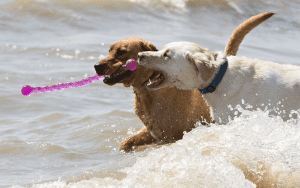
Enjoying the Outdoors with Your Furry Friends
If you're going to enjoy the warm weather, make sure your dog is good to go.
The weather is finally warming up, which means you’re probably starting to plan more outdoor adventures with your furry friends. When you’re exploring trails and parks, keep these tips in mind to make sure you and your dog have the best experience possible.
Keep ‘Em Cool
If it is too hot to hold your hand on the trail for more than five seconds, it is too hot for your dog. Remember, they don’t wear shoes like we do, so even though their paw pads are tough, they can still get burned by hot trails or pavement. In addition, dogs are always wearing a coat! They can “sweat” through their paw pads, but they don’t have the same skin or pores that humans do. Their version of sweating is panting, which is how they circulate air through their bodies to cool down.
Basic signs of heat stroke in dogs can begin with excessive panting and an unwillingness to move around. Drooling, reddened gums, a bright red tongue, vomiting, diarrhea, and stumbling are all signs your pet needs immediate care. Prevent dog heatstroke by providing plenty of water, wetting their paws, pits, and bellies during your hike, letting them rest in the shade, freezing a stuffed KONG or just leaving your friend home on hot days.
Love ‘Em, Leash ‘Em
Leashing your dog is not only courteous to other park visitors, but it protects your dog from harming or being harmed by wildlife. Off leash dogs can chase or even injure wildlife, and larger animals can feel threatened by dogs and can act aggressively in response. In addition, having your dog on a leash allows you to properly introduce them to other dogs and humans on the trail. Even though your dog may be friendly, not everyone, or their pets, enjoy being approached by an unfamiliar dog. Lastly, but very importantly, having your dog on a leash means know just where your dog did his business and allows you to clean it up immediately.
Speaking of… Trash the Poop, Not the Park
Dog waste does not biodegrade like wild animal waste because it contains meat and other processed items, giving it real staying power (you can’t even compost it). Not only that, but dog poop contains millions of bacteria and is the largest source of water pollution. The average dog produces 275 pounds of waste. In America alone, that 10 million pounds of dog poop! Remember to always bag your pet’s waste and throw it away properly in a trash receptacle – don’t leave it by the side of the trail.
 from KONG Company
from KONG Company



